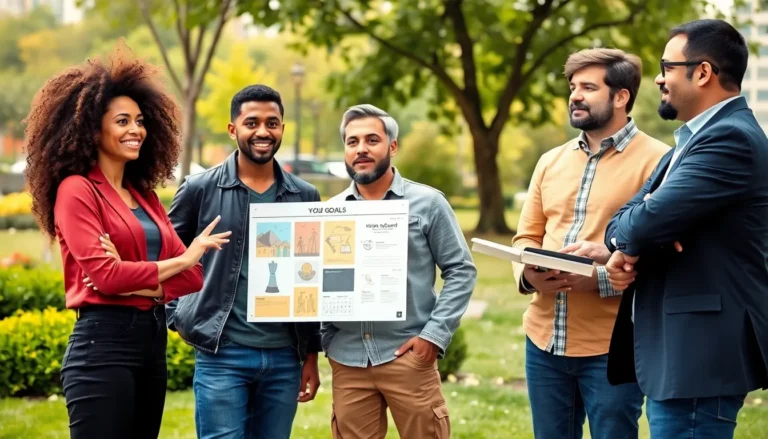Table of Contents
ToggleIn a world buzzing with endless to-do lists and the pressure to be productive, the concept of “Habitual Ease” might just be the secret sauce to navigating life with a little more grace and a lot less stress. Imagine breezing through daily tasks as if they were a walk in the park—without tripping over your own shoelaces. That’s the magic of developing habits that feel effortless.
Habitual Ease is all about creating routines that flow seamlessly into daily life, turning mundane chores into enjoyable rituals. It’s like finding the cheat code to your own personal game of life, where you can unlock the power of consistency without feeling like you’re stuck in a hamster wheel. So, why not dive into the art of making habits stick without the struggle? Your future self will thank you—preferably with a cozy cup of coffee in hand.
Understanding Habitual Ease
Habitual Ease centers around creating routines that enhance daily life without unnecessary stress. By integrating these effortless habits, individuals can approach their tasks with a sense of grace and fulfillment.
Definition of Habitual Ease
Habitual Ease describes the practice of establishing routines that flow naturally within one’s lifestyle. Focus shifts from feeling forced or overwhelmed to experiencing tasks as enjoyable rituals. This concept embraces simplicity, encouraging individuals to automate daily activities through consistent habits. By doing so, people cultivate an environment where actions become second nature, promoting ease and reducing mental clutter.
Importance in Daily Life
Habitual Ease plays a vital role in promoting balance and well-being. Streamlined routines allow individuals to manage their time effectively, leading to increased productivity. Engaging with daily chores becomes lighter and more enjoyable, contributing to an overall positive mindset. This approach helps alleviate stress, creating more room for leisure and creativity. Establishing these habits ultimately transforms life into a series of rewarding experiences, making daily tasks feel less burdensome.
Benefits of Habitual Ease

Habitual Ease offers transformative benefits that enhance daily routines. Two notable advantages include increased productivity and reduced stress levels.
Enhancing Productivity
Streamlined routines directly boost productivity. Identifying essential tasks simplifies daily planning. Establishing scheduled habits eliminates decision fatigue. Engaging in consistent actions allows individuals to focus their energy on significant goals. Daily chores become automatic, leaving more time for creative pursuits. Successful time management arises through the efficient integration of habits, driving individuals to accomplish more with less effort. Organizations often observe improved performance among employees who embrace Habitual Ease. Ultimately, productivity peaks when routines blend seamlessly into lifestyle.
Reducing Stress Levels
Habitual Ease significantly lowers stress levels. Individuals experience greater ease when tasks flow effortlessly into their day. Repetitive chores feel less daunting through well-established routines. This consistent practice cultivates a sense of control, reducing feelings of overwhelm. Individuals who adopt these habits report feeling more at peace while tackling responsibilities. Mental clutter dissipates as tasks are managed automatically. A positive mindset emerges from this balance, enhancing overall well-being. By focusing on enjoyable rituals, individuals invite more tranquility into their lives.
Strategies to Achieve Habitual Ease
Achieving Habitual Ease requires implementing effective strategies that facilitate effortless living. Two critical approaches include developing routines and embracing mindfulness practices.
Developing Routines
Establishing clear routines simplifies daily tasks. Start by identifying essential activities that align with personal goals. Consistent timing for each task enhances predictability, making activities feel less burdensome. Incorporating enjoyable elements, such as music or aromatherapy, further elevates the experience. Gradually, these routines transform into automatic behaviors, requiring minimal mental effort. Consider using tools like planners or digital reminders to stay organized. Regular reflection on routines allows for adjustments, ensuring they remain relevant and enjoyable.
Mindfulness Practices
Mindfulness practices contribute significantly to achieving Habitual Ease. Engaging in daily meditation enhances awareness and promotes a sense of calm. Allocating a few minutes for deep breathing exercises reduces stress levels, making tasks feel lighter. Observing thoughts without judgment fosters a non-reactive mindset, which eases task completion. Incorporating mindfulness into daily chores, such as washing dishes or walking, transforms these activities into meditative experiences. Regular practice cultivates presence, creating a deeper enjoyment of routine activities and inviting relaxation into daily life.
Challenges in Cultivating Habitual Ease
Cultivating Habitual Ease presents various challenges that can hinder progress. Recognizing these obstacles leads to more effective strategies for overcoming them.
Overcoming Resistance
Resistance often emerges when individuals try to adopt new habits. Fear of change can stifle motivation, making individuals cling to status quo routines. Identifying triggers that spark discomfort leverages understanding to address these feelings. A gradual approach helps; small shifts in daily practice ease anxiety. Reinforcement through positive reinforcement promotes persistence, encouraging individuals to stay committed to new habits.
Managing Change
Managing change involves adapting to new routines while maintaining balance. Individuals frequently experience disruption during transitions, leading to frustration. Setting realistic expectations is crucial, as lasting change takes time and patience. Breaking down larger goals into manageable steps provides clarity and boosts confidence. Establishing a supportive environment can enhance adaptability, allowing individuals to navigate challenges more effectively. Regular reflection ensures ongoing adjustment, reinforcing the journey toward Habitual Ease.
Embracing Habitual Ease can significantly enhance daily life. By developing routines that integrate seamlessly into one’s lifestyle, individuals can transform mundane tasks into enjoyable rituals. This shift not only reduces stress but also fosters a sense of fulfillment and tranquility.
As people adopt these effortless routines, they often find increased productivity and a more positive mindset. The journey toward Habitual Ease encourages reflection and mindfulness, allowing for a deeper connection to everyday activities.
Ultimately, cultivating these habits leads to a more relaxed and rewarding life, creating space for creativity and leisure. With the right strategies and a gradual approach, anyone can experience the benefits of Habitual Ease and enjoy a more harmonious existence.







